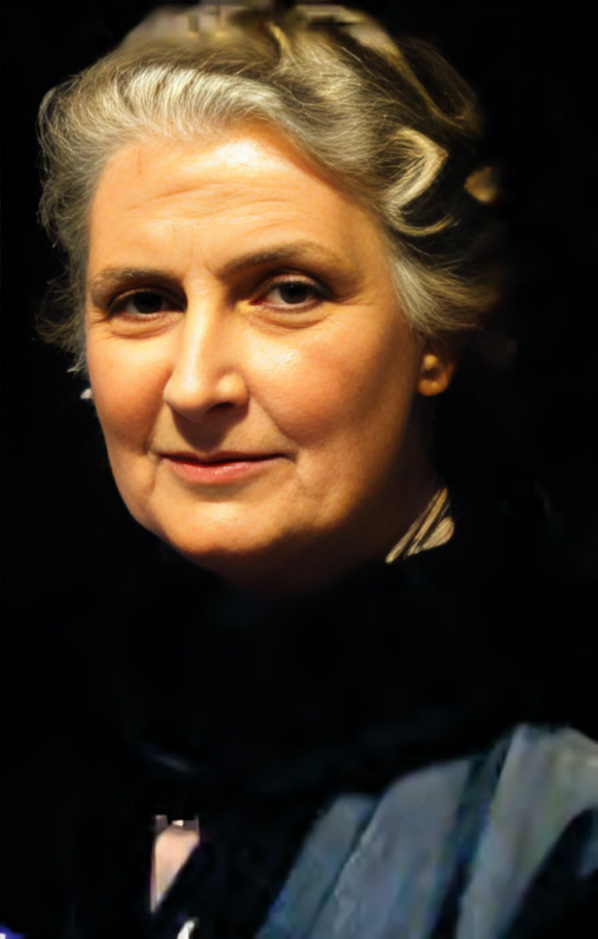Montessori System of Education
February 3, 2024 2024-04-04 4:47Montessori System of Education
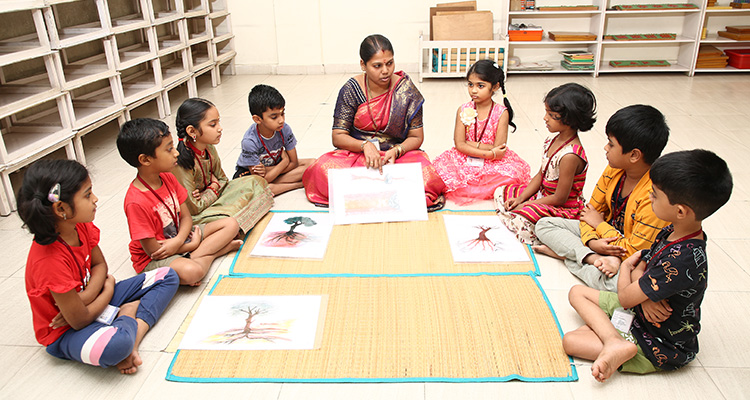
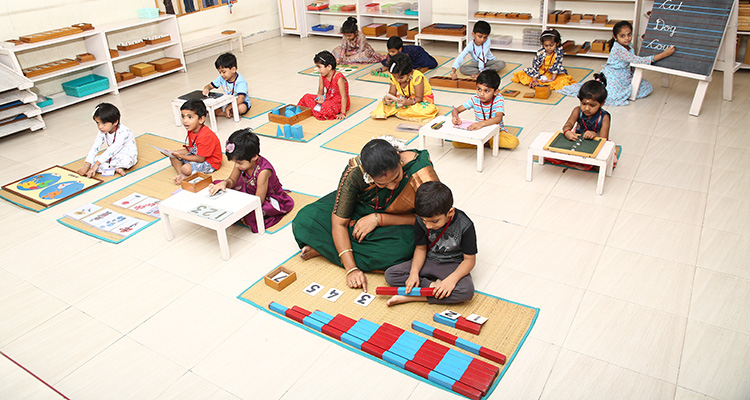
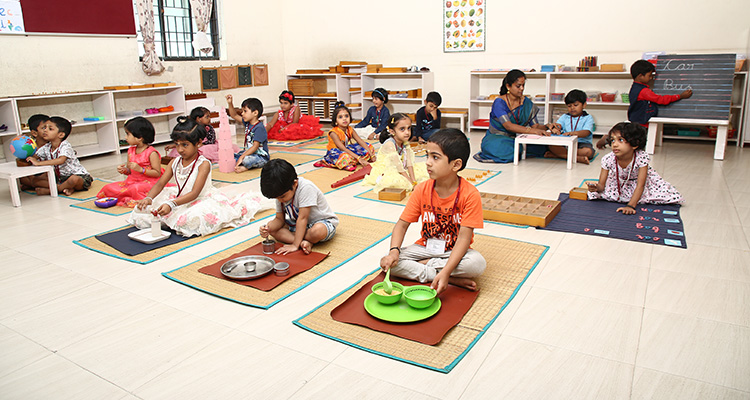
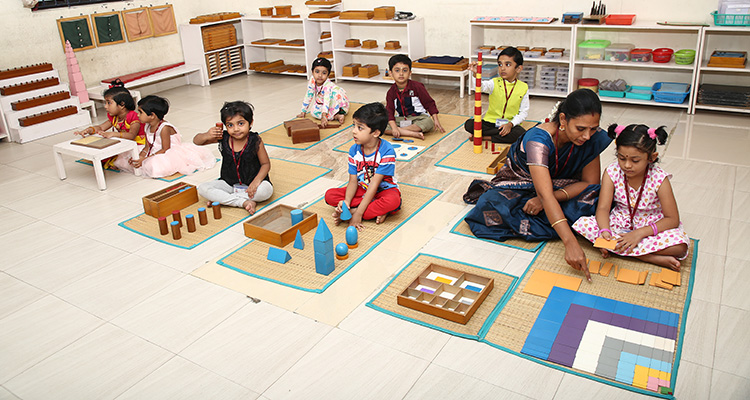
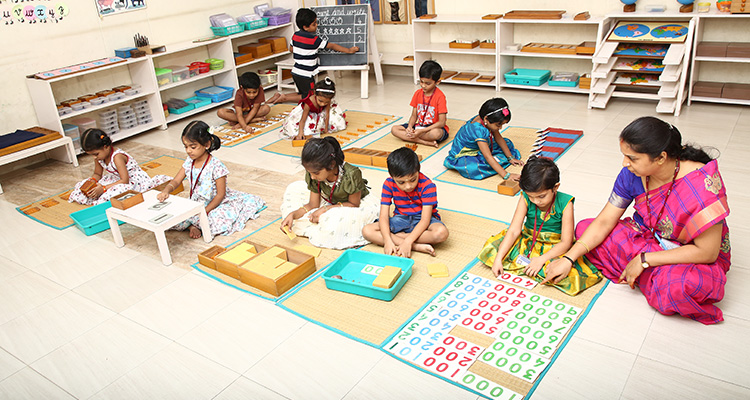
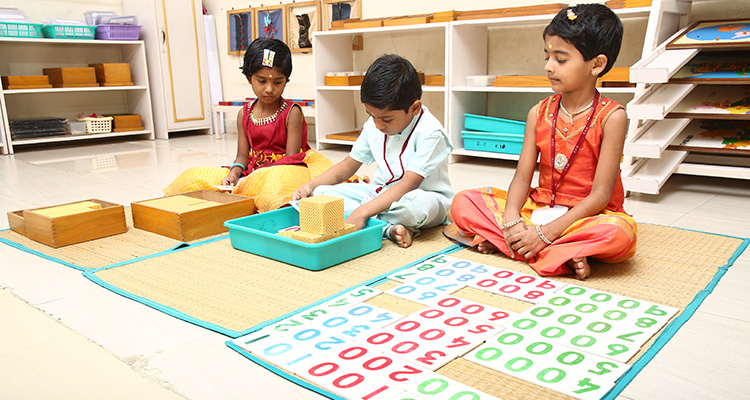
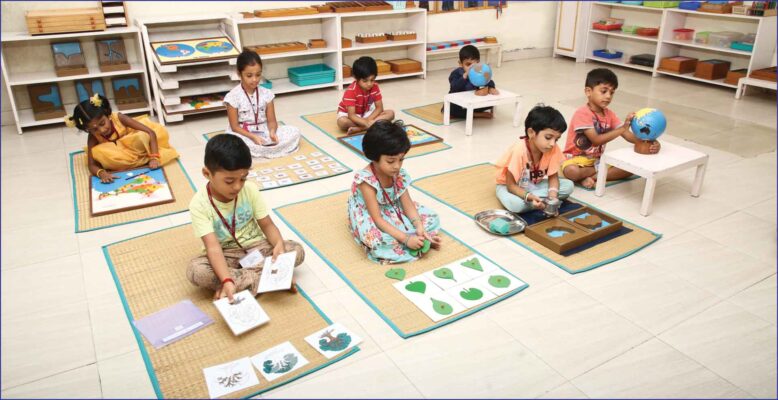
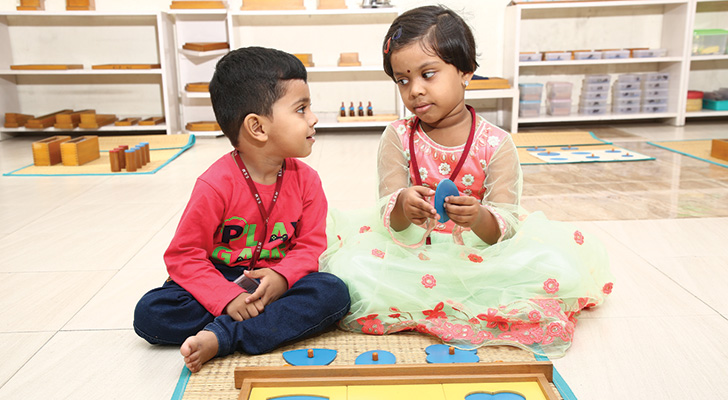
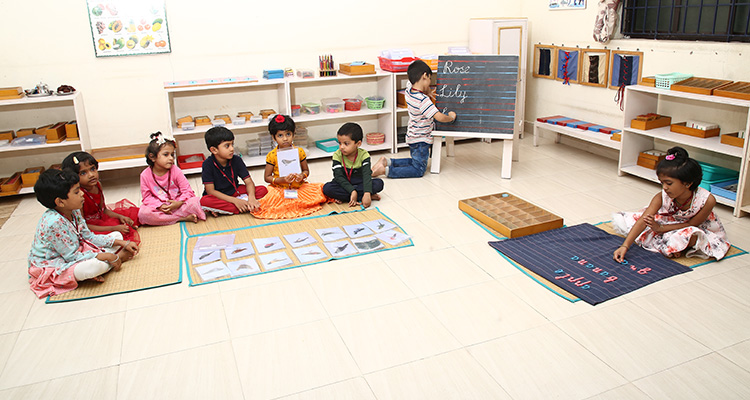
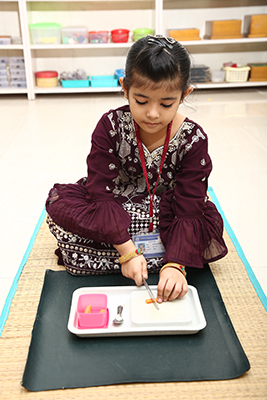
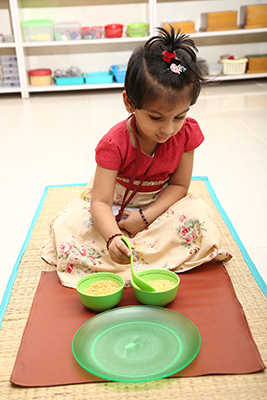
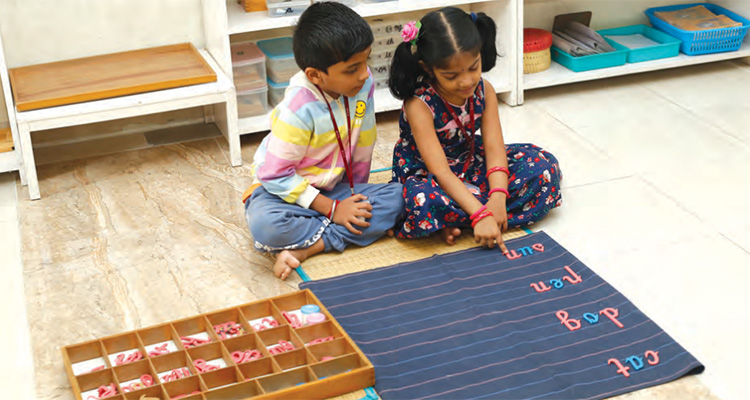
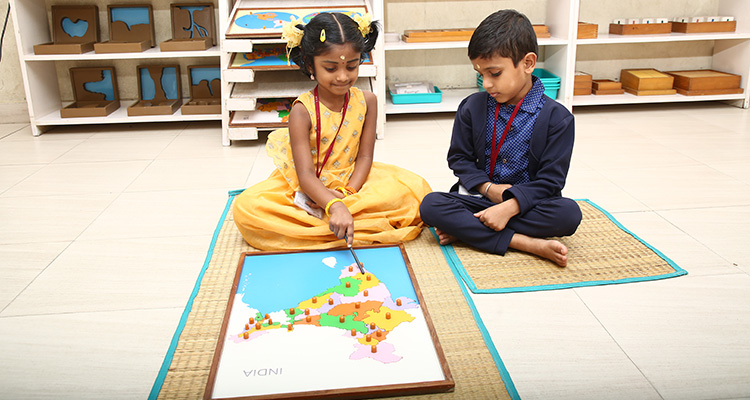
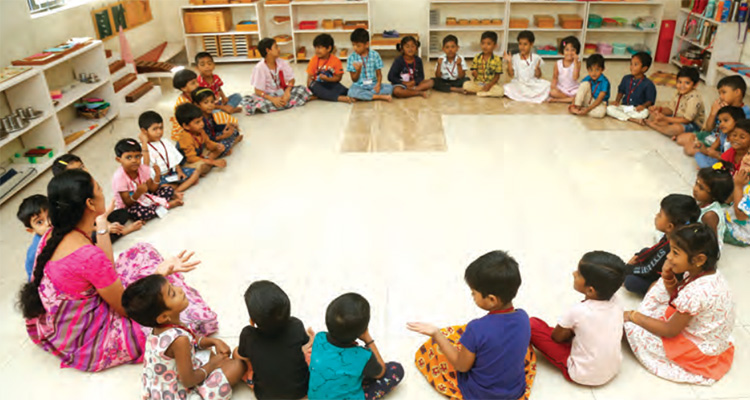
The children in the Junior Montessori in the age group of 3-6 undergo a three-year comprehensive course from JM1 to JM3. They learn through observation. This promotes analytical thinking and facilitates intense acquisition of knowledge.
The life in Junior Montessori is a period of physical growth and enhancement of sensorial and mental faculties. The children in these formative years take cognizance of their surroundings. The progressive development of the intellectual abilities, initiates inner preparation and allows free choice of working.
The well-lit, airy and ventilated environments have age-appropriate furniture which facilitate easy movement of children. The specially designed materials help the children to work with interest.
The children tend to exhibit "spontaneous discipline". They learn through activities that involve exploration, repetition, abstraction, and communication.
The life in Junior Montessori is a period of physical growth and enhancement of sensorial and mental faculties. The children in these formative years take cognizance of their surroundings. The progressive development of the intellectual abilities, initiates inner preparation and allows free choice of working.
The well-lit, airy and ventilated environments have age-appropriate furniture which facilitate easy movement of children. The specially designed materials help the children to work with interest.
The children tend to exhibit "spontaneous discipline". They learn through activities that involve exploration, repetition, abstraction, and communication.
EXERCISE OF PRACTICAL LIFE
Practical Life activities are purposeful tasks that simulate the activities involved in everyday life. Typical Practical Life activities include sweeping, dusting and food preparation. The repetition of these activities helps children develop coordination of movement, gain independence, adapt to the society and develop the ability to concentrate.
Carrying a Mat, Spooning Grains, Pouring Grains, Fastening Frames, Pounding Chenna, Funnelling, Cutting Carrot, Folding Napkin are a few of the activities that refine the motor-coordination of the children.
Carrying a Mat, Spooning Grains, Pouring Grains, Fastening Frames, Pounding Chenna, Funnelling, Cutting Carrot, Folding Napkin are a few of the activities that refine the motor-coordination of the children.
SENSORIAL
Sensorial activities refine the five senses - visual, auditory, tactile, gustatory and olfactory senses. The lessons focus on developing the five senses: seeing, hearing, touching, tasting and smelling.
Cylinder Blocks, Pink Tower, Broad Stairs, Binomial Cube, Trinomial Cube, Geometric Solids, Constructive Triangles, Colour Tablets, Rough and Smooth Boards are a few of the materials in the environment that ensure 'Control of Error’.
Cylinder Blocks, Pink Tower, Broad Stairs, Binomial Cube, Trinomial Cube, Geometric Solids, Constructive Triangles, Colour Tablets, Rough and Smooth Boards are a few of the materials in the environment that ensure 'Control of Error’.
LANGUAGE
Language activities concentrate on writing, reading, function of words and reading analysis. The children become conscious of phonetics and grammar.
Nomenclature Cards, Sandpaper Letters, Moveable Alphabet, Montessori Insets are a few of the materials that keep the children engaged with Language activities.
Nomenclature Cards, Sandpaper Letters, Moveable Alphabet, Montessori Insets are a few of the materials that keep the children engaged with Language activities.
MATHEMATICS
Mathematics includes the development of concepts such as numeration, place value and the basic operations of addition, subtraction, multiplication and division.
Number Rods, Sandpaper Numerals, Spindle Boxes, Cards and Counters are a few materials that keep the children engrossed in Mathematics activities.
Number Rods, Sandpaper Numerals, Spindle Boxes, Cards and Counters are a few materials that keep the children engrossed in Mathematics activities.
CULTURE
Cultural learning exposes children to different people and their cultures. Children learn how people have adapted to different climates, their homes, clothing, food and customs. The Cultural study refers to an integrated study that includes History, Biology, Geography and Physical Science, as well as the Arts.
Children unconsciously build skills in observation, prediction, sequencing, categorising, questioning, organising, comparing and contrasting. Wooden Puzzle Maps, Land and Water Globe, Continent Globe, Botany Cabinets are a few materials that keep the students involved in activities related to culture.
Children unconsciously build skills in observation, prediction, sequencing, categorising, questioning, organising, comparing and contrasting. Wooden Puzzle Maps, Land and Water Globe, Continent Globe, Botany Cabinets are a few materials that keep the students involved in activities related to culture.
CIRCLE TIME
Circle Time is a key component to the classroom dynamics. This activity involves the
interaction between children and teachers in a classroom community. It promotes togetherness and connects children with the concept of time.
They respect elders, arrange the things in their respective places, have food without spilling, perceive spatial adjustment, chant slokas and recite rhymes. They get tuned to social, behavioural activities. They stay engaged in both self-directed and teacher-led lessons.
They respect elders, arrange the things in their respective places, have food without spilling, perceive spatial adjustment, chant slokas and recite rhymes. They get tuned to social, behavioural activities. They stay engaged in both self-directed and teacher-led lessons.
DR. MARIA MONTESSORI DAY
Children pay due respect to Dr. Maria Montessori on her birthday which falls on 31st August every year.
The photograph of Dr. Maria is adorned with beautiful flowers. All children sing a song in her praise.
'HAPPY DAY HAPPY DAY
MARIA MONTESSORI BIRTHDAY
THROUGH HER SYSTEM ALL THE DAY
WE GET KNOWLEDGE EVERYDAY'
They understand that they get knowledge through her system of education. They cultivate the habit of respecting both the system and the materials.
The photograph of Dr. Maria is adorned with beautiful flowers. All children sing a song in her praise.
'HAPPY DAY HAPPY DAY
MARIA MONTESSORI BIRTHDAY
THROUGH HER SYSTEM ALL THE DAY
WE GET KNOWLEDGE EVERYDAY'
They understand that they get knowledge through her system of education. They cultivate the habit of respecting both the system and the materials.
SENIOR MONTESSORI
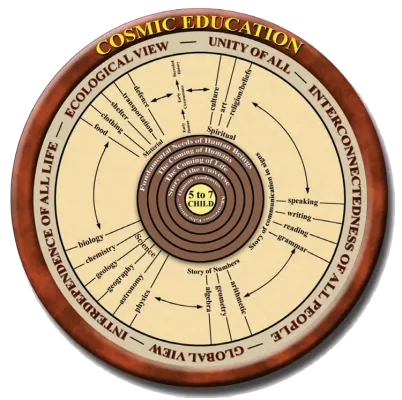
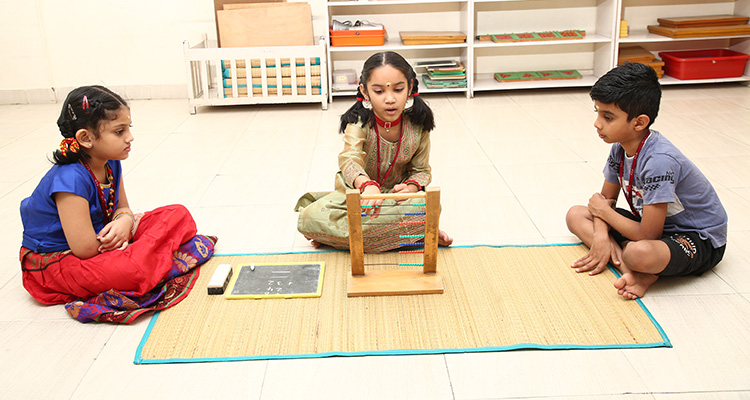

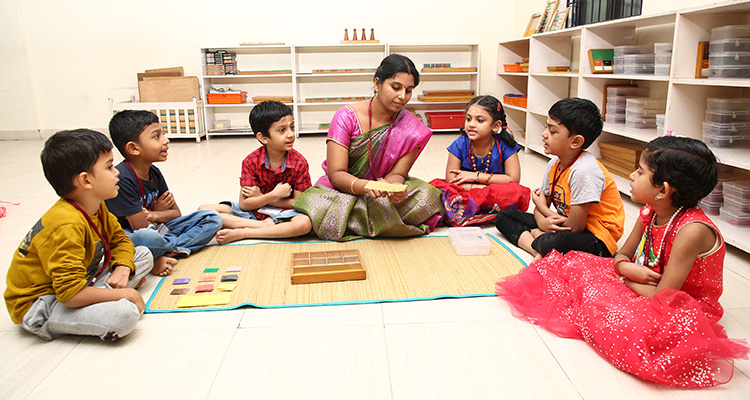
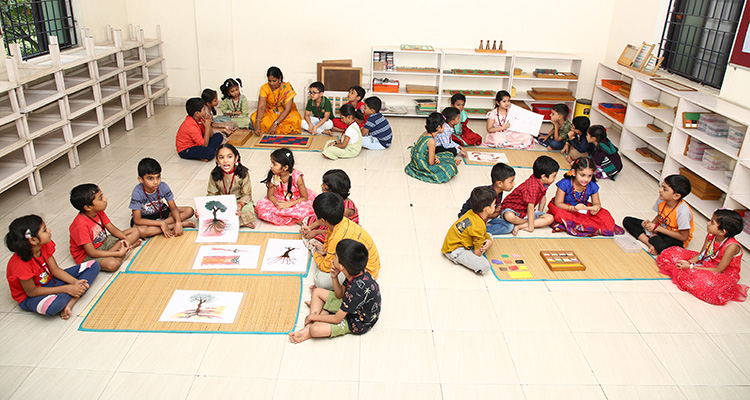
SM1 & SM2 - Classes 1 and 2
The Senior Montessori Stream of education is a dual system of learning process - a combination of Conventional and Montessori system of education. Blending both styles will make for a better learning experience and outcome.
Student - friendly materials, books and notebooks go hand - in-hand in imparting education. The children become fully equipped with knowledge for their transition from the Montessori stream into regular stream in class III.
Student - friendly materials, books and notebooks go hand - in-hand in imparting education. The children become fully equipped with knowledge for their transition from the Montessori stream into regular stream in class III.
COSMIC EDUCATION
Cosmic Education is a cornerstone of the Montessori Philosophy. It tells the story of the interconnectedness of all things. It provides the children of Senior Montessori with a framework to understand their world and their place within it. Children learn to respect studies of the past, develop an understanding of ethics, and value the contributions of others.
Children learn these "Great Lessons of Cosmic Education" as a whole curriculum and understand that the study of history, culture, science and the environment, are all interconnected. Every moment is an opportunity to understand the integrity of the universe.
In this way, Cosmic Education teaches children to become aware of the interdependence of all things and develop a sense of gratitude that comes from such an awareness.
Children learn these "Great Lessons of Cosmic Education" as a whole curriculum and understand that the study of history, culture, science and the environment, are all interconnected. Every moment is an opportunity to understand the integrity of the universe.
In this way, Cosmic Education teaches children to become aware of the interdependence of all things and develop a sense of gratitude that comes from such an awareness.
STORIES
Children become aware that the Universe evolved over billions of years. They understand through stories about the law and order through which all plants, animals and the rest of the creations are maintained.
This activity involves the interlinking of knowledge and all aspects of the Universe.
This activity involves the interlinking of knowledge and all aspects of the Universe.
LANGUAGE
Language skills are an asset that promotes effective communication. Language development follows specific and observable patterns and gets fostered in an environment that is rich in reading, writing and conversation.
These activities develop the foundational skills of language learning.
These activities develop the foundational skills of language learning.
MATHEMATICS
The power of the mathematical mind lies in its ability to quantify with precision, reason through logic, understand abstract things through patterns and interpret them for new inventions.
The children learn to explore mathematics in a concrete way and the abstract concepts become easier to comprehend in an environment with "hands-on" materials.
The children learn to explore mathematics in a concrete way and the abstract concepts become easier to comprehend in an environment with "hands-on" materials.

